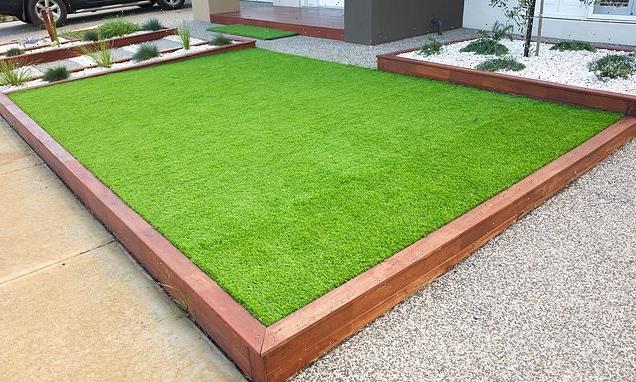
Fake lawns could be turfed out on new housing estates as Michael Gove acts on warnings they harm biodiversity
- The Housing Secretary might give local authorities power to block artificial turf
- If changes go ahead, local authorities may block developments with fake grass
- Sports pitches would be exempt and homeowners could lay it in own garden
Artificial grass could be banned or restricted on newbuild property developments under plans from Michael Gove.
Fake lawns offer households a low-maintenance alternative to real grass but environmentalists argue that they damage biodiversity by reducing wildlife habitats.
And Mr Gove is considering giving local authorities the power to block builders from laying artificial turf, according to The Sunday Times.
The Housing Secretary is set to consult on an updated version of the National Planning Policy Framework, which is used by councils when they determine applications.
Artificial grass could be banned or restricted on newbuild property developments under plans from Michael Gove. Fake lawns offer households a low-maintenance alternative to real grass but environmentalists argue that they damage biodiversity by reducing wildlife habitats
And Mr Gove is considering giving local authorities the power to block builders from laying artificial turf, according to The Sunday Times. The Housing Secretary is set to consult on an updated version of the National Planning Policy Framework, which is used by councils when they determine applications
And if the changes go ahead, local authorities would be able to block new developments where plastic lawns were due to be laid.
It is understood sports pitches would be exempt from the rules and homeowners would still be able to lay artificial lawns in their own gardens.
Even when it is removed, artificial grass can become a source of plastic pollution, as most brands are not recyclable.
But its popularity has soared over recent years, with Google searches for the material trebling in the early months of the pandemic.
A series of hosepipe bans around the country prompted many gardeners to spend thousands of pounds on fake lawns that do not die or turn brown.
Fake lawns were banned from this year’s Chelsea Flower Show after the Royal Horticultural Society described them as out of line with its ‘ethos and views’ on plastic.
Watchdogs recently ruled that two advertisements for artificial grass breached rules because the companies boasted of their green credentials.
The Advertising Standards Authority said the products could not be described as ‘eco-grass’ or ‘eco-friendly’ unless there was evidence to back up such claims.
The artificial grass industry has repeatedly said that synthetic lawns reduce water waste and can therefore have a positive impact on the environment.
The Daily Mail launched a Turn the Tide on Plastic campaign in 2008 with the aim of reducing levels of plastic pollution.
Mr Gove brought in a ban on plastic straws, stirrers and cotton buds in 2020. Another ban on single-use plastic cutlery, plates and polystyrene cups is in the offing.
Alarm raised over vanishing earthworms
Earthworm numbers have fallen by at least a third in 25 years – putting soil health at risk.
They have been hit by the rise of decking and loss of front gardens as well as by pesticides and ploughing.
Researchers led by the British Trust for Ornithology believe the earthworm population has fallen by at least 33 per cent per cent – and as much as 41 per cent –this century.
The exact decline is unclear because different studies use different techniques.
Professor James Pearce-Higgins of the BTO said: ‘They do good things for us, improving the health of the soil, which is good for plants which we rely on for food.
‘They are also a food source for many important birds.’
He said homeowners could help by not covering soil with artificial surfaces.
Source: Read Full Article


